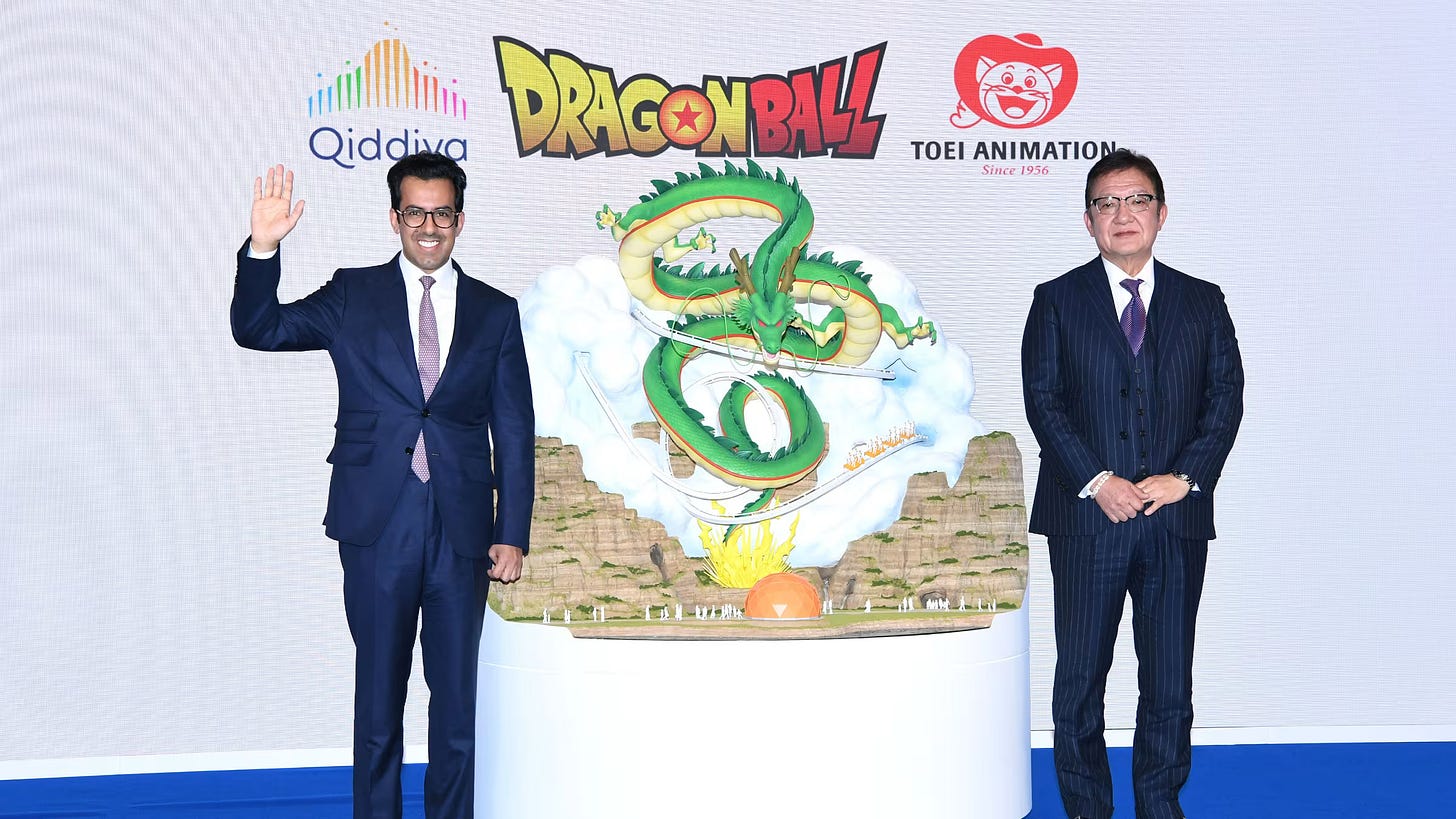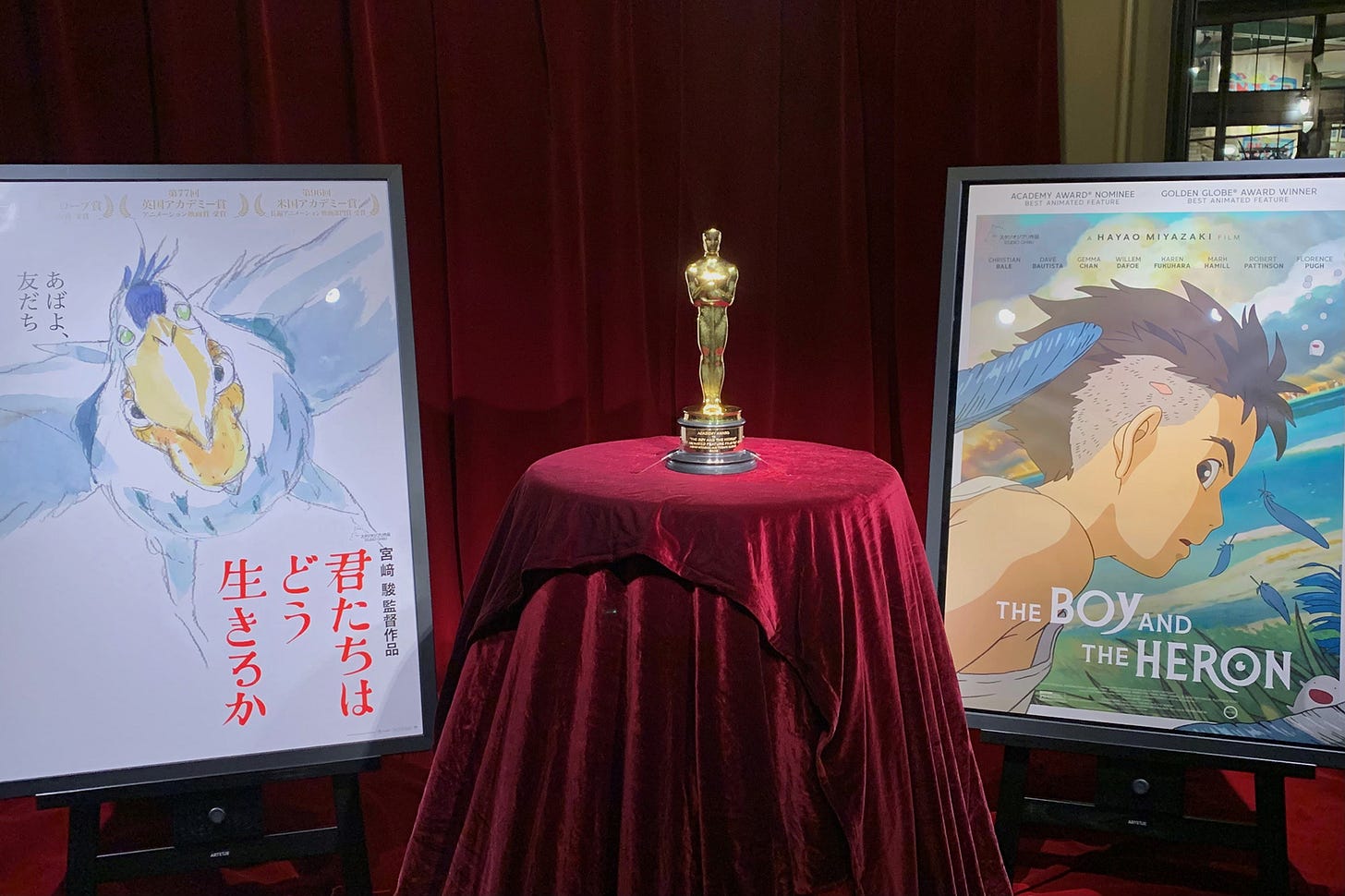Western investments on display at AnimeJapan
Plus: Saudi Arabia lands Middle East's first anime theme park; 'The Boy and the Heron' go digital; Adult manga market makes substantial digital shift; and more
This is your weekly Animenomics briefing, covering the business of anime and manga. Today is Wednesday, March 27, 2024.
In case you missed it: Frieren: Beyond Journey’s End climbed to the top of all-time anime rankings on the English-language community websites MyAnimeList and Anime News Network this week after ending its six-month broadcast.
U.S. companies showcase buying power at AnimeJapan

Attendees at the annual AnimeJapan trade exhibition last weekend saw increased presence from western production companies as investment in anime from China retreats amid the country’s stagnating economy.
Why it matters: Chinese companies had been commissioning anime projects for years, but recently anime production companies have seen more contracts with partners from the United States.
What happened: An estimated 132,557 people attended AnimeJapan 2024’s two public exhibition days, more than 30 percent higher than last year.
This year’s event also included two additional days catering to attendees who work in the anime industry, the first time in-person business days have been held since 2019.
The details: Booths by Netflix, The Walt Disney Co., Warner Bros. Discovery, and NBCUniversal spared no expense in exhibiting the American companies’ new anime investments.
Disney secured an agreement to distribute more than a dozen Macross anime titles worldwide on its Disney+ platform, three years after series rightsholder Bigwest ended a decadeslong legal dispute with Harmony Gold USA.
Warner Bros. Discovery is expanding anime production in Japan to more than 10 series per year following the successes of local properties like JoJo’s Bizarre Adventure and adaptations of DC Comics properties like Isekai Suicide Squad.
Netflix announced plans to distribute anime studio Bones’s adaptation of Time Patrol Bon, commemorating the 90th anniversary of its manga creator Fujiko F. Fujio’s birth.
Zoom out: Another growing market for anime distribution, the Middle East, was also represented this year by Saudi Arabia’s Manga Productions.
Manga Productions CEO Essam Bukhary presented a seminar on the Middle East’s anime market to business attendees.
What we’re watching: Expect more international deals to be announced in the coming months as companies continue negotiations that occurred during the in-person business days.
Saudis unveil ‘Dragon Ball’ theme park megaproject

A Dragon Ball theme park the size of Tokyo Disneyland is being built as part of an entertainment and tourism megaproject outside Riyadh, Toei Animation said last weekend at the AnimeJapan trade exhibition.
Why it matters: Saudi Arabia’s diversification of its economy away from oil and gas is sending the country’s investment funds to partner with Japanese companies for entertainment content.
Saudi companies have invested in anime production committees, signed anime licensing agreements, and created anime-themed exhibitions.
The details: The Dragon Ball theme park is part of Qiddiya City, an entertainment development project southwest of Saudi Arabia’s capital, and will span 500,000 sq. meters (120 acres).
The theme park will include more than 30 attractions, centered around a 70-meter-tall roller coaster ride intertwined with a sculpture of Shenron, the eponymous dragon from the series.
Qiddiya City will also contain other entertainment experiences, including a water theme park and a gaming and e-sports district.
How it happened: Qiddiya Investment Company, a subsidiary company of the Saudi government’s Public Investment Fund, is funding the construction, with Toei Animation granting usage rights of the Dragon Ball property.
Orlando, Fla.-based entertainment experience planner Falcon’s Beyond has been contracted by Qiddiya to be the master planner and to design the theme park’s attractions.
Earlier this year, Falcon’s Beyond announced a partnership with Tokyo-based spatial design firm Tanseisha to create entertainment experiences based on anime and manga intellectual properties.
Clippings: ‘The Boy and the Heron’ hits streaming apps

Warner Bros. Discovery’s Max streaming platform renewed an agreement with GKIDS for the exclusive rights to stream Studio Ghibli’s anime films, including Academy Award-winning The Boy and the Heron, in the United States. (Variety)
Meanwhile, Netflix secured the rights to stream The Boy and the Heron outside the U.S. and Japan, as it has with other Studio Ghibli titles, through a deal with Goodfellas (formerly Wild Bunch International).
Singapore-based Animax Asia is expanding its India footprint by joining Tata Play Binge, which has nearly 1 million subscribers and aggregates more than 30 streaming video on-demand providers. (Kidscreen)
Sony Pictures Entertainment is divesting its home video business, outsourcing production and distribution of Blu-ray and DVD discs to toy, anime, and film wholesaler Happinet. (Animation Business Journal)
Trading house Itochu is reentering the anime business after 17 years by joining satellite broadcaster Sky Perfect JSAT in establishing a company that will invest in production committees and managing international anime rights. (Nikkei Asia)
Printing conglomerate Toppan has acquired London-based Cross Media, which operates the United Kingdom’s annual Hyper Japan event highlighting Japanese culture, in an effort to further diversify its business. (Press release)
Studio Chizu producer explains anime’s global market
“We all like the words ‘global’ and ‘the world’. However, although we can share some of the same attitudes, when we try to do something concrete, there is a disconnect. If the word ‘world’ is redefined as ‘market’, I think it can be a little more organized.”
— Yuichiro Saito, anime producer and Studio Chizu president
Context: Saito gave his comments during a discussion at last week’s Niigata International Animation Film Festival, entertainment analytics and consulting firm GEM Partners reports.
Saito argues that anime producers seeking to expand their international reach need to break down the global market into smaller targeted markets, whether that is defined by genre, by geographic region, or by another definition.
The production and human resources needed to succeed vary from market to market, and different works will succeed in different markets, the co-founder of director Mamoru Hosoda’s anime studio contends.
“I feel that the world becomes easier to see when I think in this way,” Saito said.
Pornographic manga market in substantial digital shift
Japanese readers of pornographic manga are following the broader manga market trend of shifting toward consuming digital releases, according to a new survey of the country’s adult entertainment industry.
Driving the story: Digital platforms catering to pornographic manga, also known as adult manga, saw their growth accelerate during the COVID-19 pandemic.
E-commerce company DMM.com’s adult manga marketplace Fanza Books reported this month that site visits jumped 57 percent from 53.5 million to 84 million between 2021 and 2023.
By the numbers: Digital tankōbon (standalone book) releases of adult manga have nearly tripled in the last ten years, whereas the number of print releases remained flat, according to data reported in Adult Media Yearbook 2024.
Of the more than 2,300 tankōbon releases of adult manga published between January and October last year, three out of four were published digitally.
In 2013, about one in two tankōbon volumes of adult manga was published in a digital format.
Zoom in: Fanza Books’ portfolio of adult manga that was created in webtoon’s signature vertically-scrolling format has grown tenfold since early 2022.
This category, which Fanza Books calls “erotoon” (erotic webtoon), now has more than 10,000 chapters being distributed on the platform.
The bigger picture: Creator monetization platforms like Fantia and Pixiv Fanbox have also grown in popularity with adult manga creators and readers since the pandemic, the Daily Spa! tabloid reports.
“DLsite’s women-oriented website Garumani is showing a lot of activity, with works selling over 200,000 copies and artists who have never drawn erotic manga entering the market,” women’s manga researcher Mihoko Aoyagi told the tabloid.
Correction: An earlier version of this story used a chart with incorrect percentage change values based on incomplete 2023 data that was mislabeled as 2022 data.
Animenomics is an independently-run and reader-supported publication. If you enjoyed this newsletter, consider sharing it with others.




Wow, a Dragon Ball theme park, never thought I'd see the day. I'd love for there to be an anime theme park that rivals Disneyland. You have all the popular anime: Naruto, One Piece, Dragon Ball, and whatever else can make the cut; create rides, haunted houses, amusement for each anime, I'd love to see that one day.
Was happy to read that HBO Max would get "The Boy and the Heron". Then I kept reading it was only in the US. 😭
Do you know any info about the blu-ray release for it?